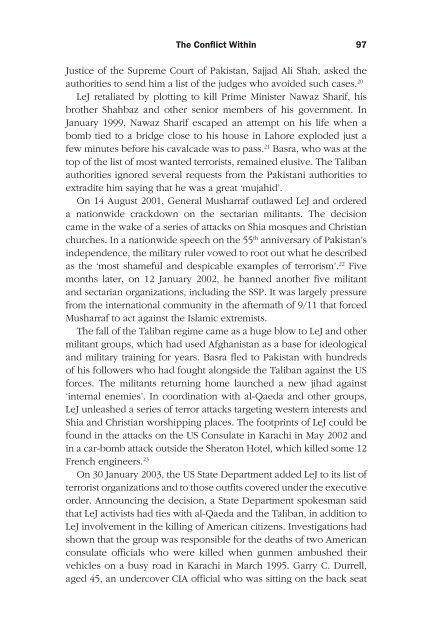Frontline Pakistan : The Struggle With Militant Islam - Arz-e-Pak
Frontline Pakistan : The Struggle With Militant Islam - Arz-e-Pak
Frontline Pakistan : The Struggle With Militant Islam - Arz-e-Pak
Create successful ePaper yourself
Turn your PDF publications into a flip-book with our unique Google optimized e-Paper software.
<strong>The</strong> Conflict <strong>With</strong>in<br />
Justice of the Supreme Court of <strong><strong>Pak</strong>istan</strong>, Sajjad Ali Shah, asked the<br />
authorities to send him a list of the judges who avoided such cases. 20<br />
LeJ retaliated by plotting to kill Prime Minister Nawaz Sharif, his<br />
brother Shahbaz and other senior members of his government. In<br />
January 1999, Nawaz Sharif escaped an attempt on his life when a<br />
bomb tied to a bridge close to his house in Lahore exploded just a<br />
few minutes before his cavalcade was to pass. 21 Basra, who was at the<br />
top of the list of most wanted terrorists, remained elusive. <strong>The</strong> Taliban<br />
authorities ignored several requests from the <strong><strong>Pak</strong>istan</strong>i authorities to<br />
extradite him saying that he was a great ‘mujahid’.<br />
On 14 August 2001, General Musharraf outlawed LeJ and ordered<br />
a nationwide crackdown on the sectarian militants. <strong>The</strong> decision<br />
came in the wake of a series of attacks on Shia mosques and Christian<br />
churches. In a nationwide speech on the 55 th anniversary of <strong><strong>Pak</strong>istan</strong>’s<br />
independence, the military ruler vowed to root out what he described<br />
as the ‘most shameful and despicable examples of terrorism’. 22 Five<br />
months later, on 12 January 2002, he banned another five militant<br />
and sectarian organizations, including the SSP. It was largely pressure<br />
from the international community in the aftermath of 9/11 that forced<br />
Musharraf to act against the <strong>Islam</strong>ic extremists.<br />
<strong>The</strong> fall of the Taliban regime came as a huge blow to LeJ and other<br />
militant groups, which had used Afghanistan as a base for ideological<br />
and military training for years. Basra fled to <strong><strong>Pak</strong>istan</strong> with hundreds<br />
of his followers who had fought alongside the Taliban against the US<br />
forces. <strong>The</strong> militants returning home launched a new jihad against<br />
‘internal enemies’. In coordination with al-Qaeda and other groups,<br />
LeJ unleashed a series of terror attacks targeting western interests and<br />
Shia and Christian worshipping places. <strong>The</strong> footprints of LeJ could be<br />
found in the attacks on the US Consulate in Karachi in May 2002 and<br />
in a car-bomb attack outside the Sheraton Hotel, which killed some 12<br />
French engineers. 23<br />
On 30 January 2003, the US State Department added LeJ to its list of<br />
terrorist organizations and to those outfits covered under the executive<br />
order. Announcing the decision, a State Department spokesman said<br />
that LeJ activists had ties with al-Qaeda and the Taliban, in addition to<br />
LeJ involvement in the killing of American citizens. Investigations had<br />
shown that the group was responsible for the deaths of two American<br />
consulate officials who were killed when gunmen ambushed their<br />
vehicles on a busy road in Karachi in March 1995. Garry C. Durrell,<br />
aged 45, an undercover CIA official who was sitting on the back seat













